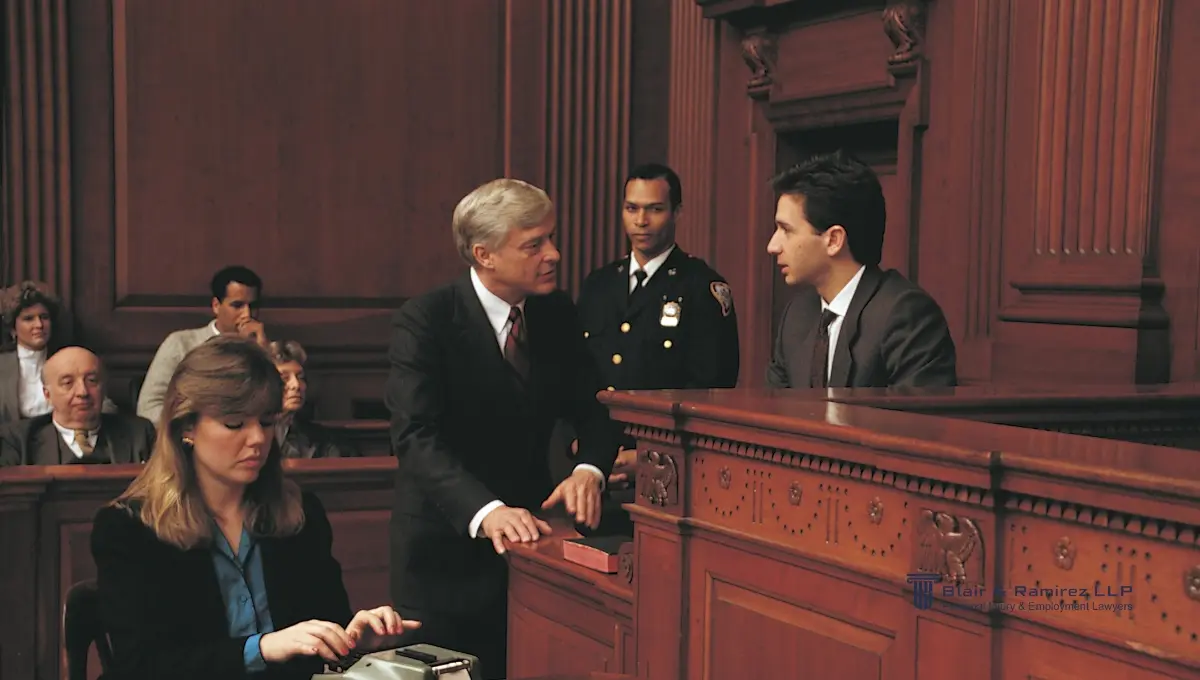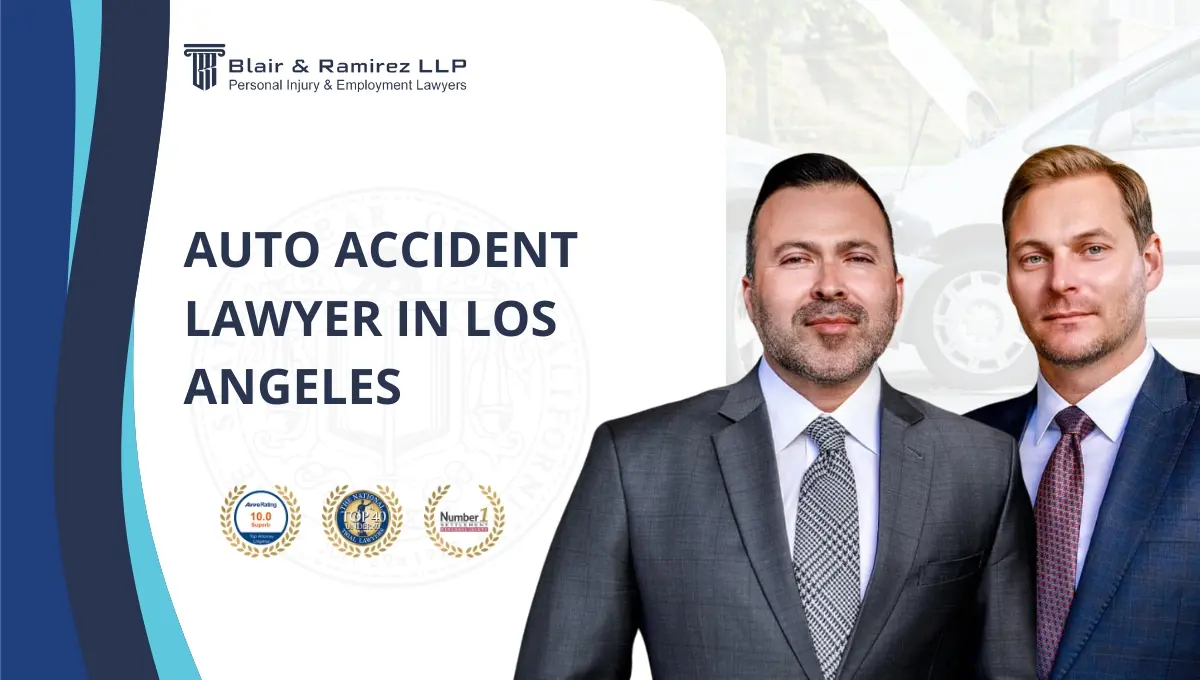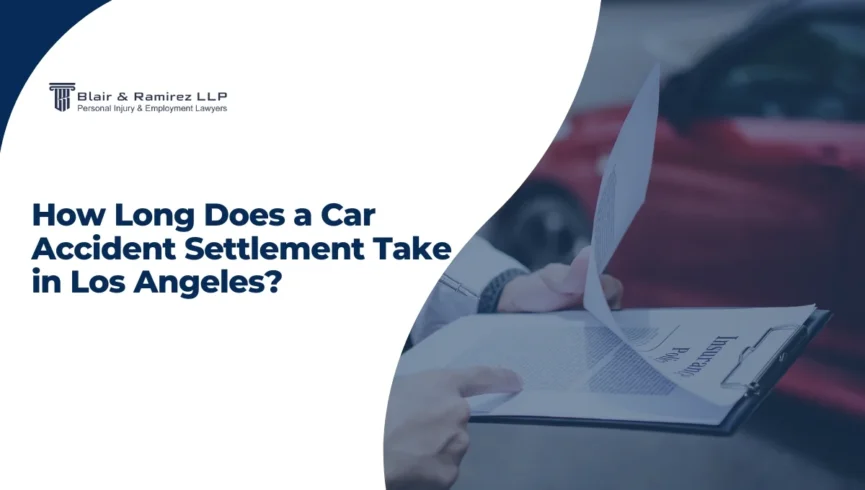Most car accident settlements in Los Angeles are resolved within 2 to 12 months; but every case is different. Minor claims with clear liability can settle in as little as 60 days, while more complex cases involving surgery, disputed fault, or uncooperative insurance companies may take a year or more.
In the aftermath of a crash, you’re not just dealing with physical pain, you’re facing mounting medical bills, a damaged vehicle, and an insurance company that’s dragging its feet. That’s why knowing what to expect from the settlement process matters; it brings clarity, control, and peace of mind.
At Blair & Ramirez LLP, we specialize in helping injured clients navigate the complexities of car accident settlements. Our experienced auto accident attorneys handle all communication with insurers, meticulously organize all necessary documentation, and apply legal pressure when insurers attempt to stall the process. With us, you can feel confident that your case is in capable hands.
When you work with us, you’re not just waiting, you’re moving forward. We fight for fast, full settlements, because you deserve more than delays. You deserve results.
How Long Does a Car Accident Settlement Take in Los Angeles?
Most car accident settlements in Los Angeles take between 2 and 12 months. This timeline is influenced by a variety of factors, including the severity of the injury, the responsiveness of the insurance company, and the presence of legal representation.
What Is the Average Timeline for a Car Accident Settlement in Los Angeles?
One of the first things clients want to understand is how long their car accident settlement might take, and the truth is, it depends on several key factors. Every case is unique, but knowing what influences the timeline can give you a clearer path forward.
In Los Angeles, where accidents are common and court systems are overwhelmed, settlement timelines can range from a few weeks to well over a year. Factors like the severity of your injuries, insurance company delays, and the complexity of your case all impact how long it takes to reach a resolution.
Typical Settlement Range: A Few Weeks to Over a Year
Car accident settlements in Los Angeles can range from a few weeks to well over a year, depending on the severity of the injury and the complexity of the case.
For example:
A minor rear-end accident with no injuries may settle in as little as 4-6 weeks after a basic insurance review.
A serious crash involving spinal injuries, surgery, and long-term rehab may take 12-18 months or longer to fully resolve.
The timeline depends on several key factors:
- Medical recovery: Settlements often wait until treatment is complete or future care is clearly defined.
- Insurance cooperation: Some insurers move quickly, others delay or dispute every detail.
- Legal strategy: Complex cases may require expert testimony or in-depth documentation that takes time to build.
Understanding the timeline helps you set realistic expectations, and with the right legal team guiding the process, you can focus on healing while we focus on delivering results.
Fast-Track Settlements vs. Contested Claims
Not all car accident claims follow the same path. Some settle quickly, others require a strategic fight.
Fast-track settlements typically occur when:
- Fault is clear
- Injuries are minor
- All documentation is promptly submitted
For example, if you were rear-ended at a stoplight and the other driver accepts blame, your case might resolve within 30-60 days.
Contested claims, on the other hand, involve:
- Disputed liability
- Serious or long-term injuries
- The need for expert evaluations or accident reconstruction
These cases require thorough investigation, aggressive negotiation, and often take 12 months or more to resolve.
When your settlement is finally reached, it’s worth understanding how car accident settlements are taxed, since that can affect the true value of your payout.
Why Los Angeles Cases Take Longer
Settlements in Los Angeles often take longer, not because your case lacks merit, but because of the city’s unique challenges.
With one of the highest traffic volumes in the nation and a dense population, LA sees a constant stream of collisions and insurance claims. This overwhelms insurers and clogs the legal system.
The LA Superior Court is known for civil case backlogs, with some trials delayed 12 months or more. Add in regional insurers that are slow to investigate or respond, and the settlement timeline can stretch even further.
At Blair & Ramirez LLP, we know how to navigate these delays, apply legal pressure, and keep your case moving, so you’re not stuck waiting while the system drags its feet.
What Factors Influence How Long Your Settlement Takes?
The time it takes to settle a car accident claim depends on several factors, including the severity of your injuries, how quickly medical treatment concludes, whether fault is disputed, and how cooperative the insurance company is. Delays result from incomplete documentation or insurer negotiation tactics.
Severity of Injuries and Maximum Medical Improvement (MMI)
One of the most important factors affecting your settlement timeline is the severity of your injuries, and whether you’ve reached Maximum Medical Improvement (MMI). MMI is the point where your condition has stabilized, and doctors can clearly assess any lasting effects or future treatment needs.
Settling before MMI can cost you thousands, as it’s nearly impossible to accurately calculate long-term medical expenses, lost earning capacity, or permanent disabilities. The more serious the injury, the longer it may take to reach this point, but waiting ensures you don’t settle for less than your case is truly worth.

Fault or Liability Disputes Can Prolong the Settlement Process
When liability is disputed, meaning it's unclear who was negligent or whether comparative fault applies, settlement negotiations often stall. Insurance carriers typically delay payment until they conduct a thorough investigation, including reviewing police reports, eyewitness testimony, dashcam footage, and any available accident reconstruction analysis.
In cases involving shared liability, the insurer may argue for a reduced payout under California’s comparative negligence rules, claiming the injured party bears partial responsibility. If material facts are in dispute or critical evidence is missing, resolution can be significantly delayed.
Incomplete Medical Documentation or Ongoing Treatment Can Delay Claim Valuation
Insurance carriers often delay settlement negotiations when a claimant is still undergoing active medical treatment or when medical documentation is incomplete. Without a full set of medical records, including diagnoses, prognoses, and treatment plans, it becomes difficult to determine the extent of damages, particularly future medical expenses and potential permanent impairment.
Insurers may argue that without reaching Maximum Medical Improvement (MMI), any valuation of special damages (like medical costs) or general damages (such as pain and suffering) is speculative. This uncertainty gives them grounds to withhold a fair settlement offer or dispute the claim altogether.
Insurance Tactics That Delay Your Claim
Insurance companies are not in the business of paying quickly or fairly. Many use a well-known strategy: deny, delay, and defend. These tactics are designed to wear you down, create frustration, and pressure you into accepting a low settlement, or walking away entirely.
They may question the extent of your injuries, request endless documentation, or drag out the investigation, all to minimize their liability and protect their bottom line.
The Critical Role of Legal Representation in Speeding Up Your Settlement
Handling your case without a lawyer can slow progress due to paperwork errors, missed deadlines, or a lack of negotiation leverage. Blair & Ramirez LLP speeds up settlement timelines by communicating directly with insurers, organizing medical and legal documents, and applying legal pressure when adjusters delay responses.
Trying to handle a car accident claim on your own can lead to costly delays, missed deadlines, incomplete documentation, and little leverage against seasoned insurance adjusters. Without legal representation, insurers are more likely to stall, undervalue your claim, or deny it outright.
We do more than just manage paperwork, we take control of the process. Our team:
- Communicates directly with insurance carriers to cut through delays
- Organizes and presents medical and legal evidence in a format that compels serious offers
- Applies legal pressure when adjusters drag their feet or use bad faith tactics
With us in your corner, you're not just hoping for a fair outcome, you’re strategically positioned to secure it faster and for the full value you deserve.
Steps in the Car Accident Settlement Process
Reaching a fair car accident settlement in Los Angeles takes more than patience, it requires a strategic, well-executed approach. Below are the four essential steps to help you secure the full compensation you deserve:
| No. | Step | What Happens | Estimated Timeframe |
|---|---|---|---|
| 1. | Initial Treatment & Documentation | Focus on your medical recovery and gather essential evidence, medical records, accident photos, receipts, and police reports. This forms the foundation of your claim. | 1–4 weeks |
| 2. | Investigation & Liability Assessment | Your attorney and/or the insurance company will evaluate who was at fault, interview witnesses, and review all available evidence to establish liability. | 2–6 weeks |
| 3. | Demand Letter & Negotiations | A formal demand letter is sent outlining your injuries, damages, and requested compensation. Settlement negotiations begin and may involve counteroffers. | 4–12 weeks |
| 4. | Settlement Agreement or Litigation | If a fair settlement is reached, documents are signed and payment follows. If not, your case may proceed to litigation, where we’re fully prepared to fight in court. | 2 weeks to 12+ months (if litigation occurs) |
When Will You Actually Receive Your Settlement Check?
Reaching a settlement is a significant step, but it's not the finish line. After dealing with injuries, mounting bills, and insurance delays, it’s only natural to want to know exactly when the money will reach your hands.
While the settlement agreement is a critical milestone, there are still a few legal and administrative steps before disbursement can occur. Understanding what happens next, and what may cause delays, can help you stay informed and prepared.
Time Between Agreement and Disbursement
Once a settlement agreement is executed, you can typically expect disbursement of funds within 2 to 6 weeks. After the insurance carrier issues the settlement draft, it is sent to your attorney’s trust account for processing.
Your attorney will then:
- Deduct attorney’s fees and case-related costs as outlined in the retainer agreement
- Satisfy outstanding medical liens or subrogation claims from healthcare providers or insurers
- Disburse the net proceeds directly to you, the claimant
In more complex cases involving multiple lienholders or structured settlements, the process may take longer due to the need for final lien resolution and approval of allocation terms.
Throughout this final stage, your legal team ensures every dollar is accounted for and that you receive your rightful compensation as quickly and smoothly as possible.
Causes of Post-Settlement Delays
Even after a settlement agreement is finalized, certain factors can delay the disbursement of proceeds. Common post-settlement delays include:
- Insurer processing time, which can range from 7 to 21 days, depending on the carrier’s internal procedures.
- Clerical errors or deficiencies in the executed documents, requiring correction or re-execution before funds are released.
- Administrative slowdowns due to weekends, court holidays, or insurer backlog.
- Banking and trust account clearance delays, which can impact the timing of final disbursement to the claimant.
While these issues are typically procedural, each can extend the post-settlement timeline by several days, or in some cases, a few weeks.
Deducting Liens Before Payment
Before net settlement proceeds can be released to you, any valid medical liens or subrogation claims must be addressed. Healthcare providers, hospitals, and insurance carriers such as Medicare, Medi-Cal, or private insurers may assert a legal right of reimbursement for medical services rendered related to your accident.
This process involves:
- Verification of lien validity
- Negotiation and reduction of lien amounts, where applicable
- Satisfaction of all outstanding obligations before final disbursement
Typically, lien resolution takes 1 to 4 weeks, depending on the number of lienholders and the responsiveness of the providers. Cases involving government payors or multiple medical facilities may require additional time due to more stringent verification and approval procedures.
At Blair & Ramirez LLP, we actively negotiate and expedite lien resolution to ensure you receive the maximum possible recovery, without unnecessary delays.
Can a Los Angeles Car Accident Lawyer Speed Things Up?
How Attorneys Reduce Insurer Delays
An experienced car accident attorney plays a critical role in reducing delays caused by insurance carriers. By engaging in direct communication with claims adjusters and ensuring all required documentation, including medical records, billing statements, police reports, and proof of damages, is submitted accurately and on time, legal counsel keeps your claim on track.
Attorneys also eliminate unnecessary correspondence delays by promptly responding to insurer inquiries, submitting complete demand packages, and addressing any requests for additional information in accordance with industry standards and claims handling regulations.
This proactive, legally sound approach minimizes the risk of administrative hold-ups and ensures your case advances efficiently through the claims resolution process, rather than stalling in an adjuster's queue.

Applying Legal Pressure During Settlement Negotiations
Insurance carriers often engage in delay tactics or extend unreasonably low settlement offers when they believe a claimant is unrepresented or unlikely to pursue litigation. However, the involvement of experienced legal counsel shifts that dynamic entirely.
A seasoned car crash attorney builds a compelling case supported by admissible evidence. This level of preparation signals to the insurer that the claim is both legitimate and trial-ready.
By citing relevant case law, invoking bad faith insurance practices where applicable, and positioning the case for civil litigation, attorneys create significant legal leverage. This compels insurers to negotiate in good faith and present fair settlement offers, or face exposure in court.
In short, legal representation transforms your claim from a negotiable nuisance into a credible legal threat, expediting the process and increasing your chances of a full and fair recovery.
Preventing Administrative Delays Through Accurate Legal Documentation
One of the most common causes of claim delays is administrative error: including incomplete forms, missing signatures, and failure to submit required supporting documentation, such as medical records, billing statements, or proof of damages. These deficiencies often result in claim denials, requests for supplemental information, or placement into administrative backlog.
An experienced car accident attorney ensures compliance with claims submission protocols by preparing and filing comprehensive, legally compliant documentation from the outset. This includes properly executed authorization forms, itemized damages, and verified medical reports, all submitted within required timelines.
By proactively addressing these procedural requirements, your legal counsel significantly reduces the risk of processing delays and keeps your car accident claim moving efficiently through the claims resolution pipeline, ultimately accelerating your access to fair compensation.
Why Car Accident Settlement Delays Can Be Worth It
Although extended timelines can be frustrating, they often result in significantly higher compensation. Delaying settlement until you reach Maximum Medical Improvement (MMI) allows your attorney to accurately calculate future medical expenses, lost earning capacity, and long-term damages. This comprehensive valuation strengthens your demand package and increases the likelihood of a full and fair recovery. In short, strategic patience often maximizes your legal and financial outcome.
Risk of Settling Too Early
Accepting a settlement before reaching MMI can significantly limit your recovery. Once a release of claims is signed, you forfeit the right to pursue additional compensation, even if unforeseen complications arise, such as the need for surgery or long-term rehabilitation. Insurers often exploit this urgency by presenting lowball offers early in the process, knowing that injured parties may be tempted to resolve the claim quickly. A premature settlement may fail to account for future medical expenses, loss of earning capacity, or permanent impairment, ultimately leaving you undercompensated for your actual damages.
How Insurers Use Delay to Their Advantage
Insurance carriers frequently employ delay-and-diminish strategies designed to wear down claimants and compel premature, undervalued settlements. Adjusters may intentionally stall communication, prolong investigations, or request redundant documentation, all calculated efforts to erode your financial stability and increase pressure to settle. This tactic is especially effective when claimants are unrepresented.
Retaining legal counsel neutralizes this strategy. An experienced car accident lawyer recognizes bad faith practices, invokes claims handling statutes, and applies procedural pressure to compel timely responses. With legal representation, insurers are far less likely to delay or devalue your claim without consequence.
Protecting Your Long-Term Medical and Financial Needs
Not all injuries manifest immediately after a motor vehicle collision. Delayed-onset conditions, such as traumatic brain injuries, spinal disc herniations, or soft tissue damage, may require ongoing treatment, rehabilitative care, or surgical intervention that only becomes evident over time.
Premature settlement compromises your ability to recover future medical expenses, loss of earning capacity, and other economic and non-economic damages. By deferring settlement until you reach Maximum Medical Improvement, your attorney can obtain comprehensive medical evaluations and expert opinions that support a full valuation of your long-term needs. This strategic timing ensures your claim reflects the totality of your damages, both present and future, thereby maximizing your rightful compensation.
Can You Afford to Wait for Your Settlement?
If you are struggling to cover bills while your case is pending, you are not alone. While it's often smart to wait for a fair settlement, there are temporary options to help you manage day-to-day expenses during this time.
Is Pre-Settlement Funding an Option?
Pre-settlement funding, also known as legal funding or litigation financing, allows claimants to access a portion of their anticipated settlement proceeds in advance.
Unlike traditional loans, this form of non-recourse funding does not require repayment unless your case results in a recovery.
While it can provide short-term financial relief during a prolonged claims process, it’s essential to proceed with caution. Many third-party funders impose high fees, compounding interest rates, or unfavorable terms that can significantly diminish your net recovery at the time of disbursement.
Before entering into any funding agreement, consult with your attorney. Legal counsel can review contract terms, assess the necessity of the advance, and ensure compliance with ethical obligations and lien prioritization rules, protecting both your rights and your future compensation.
Managing Living Costs During Your Claim
Sustaining financial stability during a personal injury claim, particularly when injuries prevent you from working, can be challenging. However, several legally sound strategies can help claimants manage essential expenses while their case is pending:
- Medical Liens: Many providers offer treatment on a lien basis, deferring payment until your case settles.
- Public Assistance Programs: Government and nonprofit services can help cover rent, utilities, or transportation during recovery.
- Attorney Referrals: Your legal team can connect you with lien-based care and financial resources aligned with personal injury claims.
With proper legal support, these strategies can ease short-term burdens while preserving your long-term compensation.
How Injury Type Affects Settlement Timelines
The nature and severity of your injuries play a major role in how long it takes to settle a car accident claim. More serious injuries usually require longer recovery periods, which delays both medical clarity and settlement negotiations.
Soft Tissue vs. Brain or Spinal Injuries
| Injury Type | Examples | Recovery Time | Settlement Timeline | Key Consideration |
|---|---|---|---|---|
| Soft Tissue Injuries | Whiplash, sprains, and minor muscle strains | 2-3 weeks | Often settled within 1-3 months | Recovery is predictable and quick |
| Brain Injuries | Concussion, traumatic brain injury (TBI) | Several months to over a year | 6-12+ months | Requires long-term observation and future care cost estimates |
| Spinal Cord Injuries | Herniated disc, paralysis, spinal fracture | Months to lifelong | 12+ months, sometimes longer | Settlement is delayed until Maximum Medical Improvement (MMI) is reached |
When Surgery or Long-Term Care Is Needed
Injury claims involving surgery or prolonged rehabilitation often take longer to settle. Recovery timelines must be clear, and physicians must determine whether additional treatment or permanent impairment is likely before the claim can be accurately valued and resolved.
Recovery Time as a Negotiation Factor
Extended recovery gives your attorney critical leverage. Insurers typically hold back full-value offers until your medical condition stabilizes, but a longer recovery period allows for detailed documentation of treatment, pain, and limitations. This strengthens your claim and justifies higher compensation, especially in cases involving surgeries, complications, or long-term therapy.
How Los Angeles Legal System Causes Settlement Delays
Even with a strong case, car accident settlements in Los Angeles often move more slowly than expected. High population density, severe traffic, and an overburdened legal system create unique local bottlenecks that can delay resolution, especially if your case heads toward litigation.
Local Court Congestion and Trial Backlogs
High Accident Volume and Claim Processing Delays
Should You Take Your Car Accident Case to Trial?
Sometimes, a fair settlement just is not possible. If the insurer delays, denies, or lowballs your claim, going to trial may be your best option to pursue full and fair compensation. Here’s how to determine if it's time to take legal action and what that path entails.

Signs the Insurer Is Lowballing or Stalling
If you notice any of these red flags, it may be time to talk to a trial lawyer:
- The adjuster keeps asking for “just one more document”.
- You receive a settlement offer that does not cover all your medical bills.
- They dispute liability despite strong evidence.
- The insurer avoids calls or takes weeks to respond.
- They pressure you to settle quickly.
- You are told you don’t need a lawyer.
Settlement vs. Litigation Timeline
Choosing to go to trial significantly affects your timeline. While settlements may finalize in 2 to 12 months, litigation can extend your case by 6 to 18 months or more. Court delays, discovery phases, and scheduling conflicts all add time, but a trial can also lead to a higher payout when negotiations fail.
When It’s Better to Settle
Settling out of court is often the best move if:
- You want to avoid months (or years) of legal proceedings.
- You’d rather not relive the accident during testimony.
- You need compensation sooner due to financial pressure.
- You value keeping the matter private.
Litigation increases potential payouts but introduces extended wait times and uncertainty. Our auto accident attorney will help you weigh all the options before making a decision.
How Long Do You Have to Settle a Car Accident Claim in California?
California law places firm deadlines on how long you have to take legal action after a car accident. This section outlines those deadlines, what happens if you miss them, and the few exceptions that might extend your time.
Statute of Limitations for Personal Injury in CA
California’s statute of limitations for personal injury claims is 2 years from the date of the car accident. If the injury was discovered later, the deadline may be extended under the discovery rule.
Example: If you were injured in a crash on January 10, 2023, you generally must file by January 10, 2025.
What Happens If You Miss the Deadline
Missing the statute of limitations deadline results in losing the legal right to file a lawsuit. The court will most likely dismiss your case, and the insurer has no reason to negotiate further. While rare, certain exceptions may apply, which we explain next.
Tolling Rules and Exceptions
“Tolling” pauses the legal deadline in specific situations. California recognizes these key exceptions:
- Minor Victim: If the injured person is under 18, the clock does not start until they turn 18.
Example: A 16-year-old injured in 2022 can file until 2 years after their 18th birthday. - Mental Incapacity: If the person is mentally incapacitated after the crash, the deadline may pause until they regain capacity.
Example: A coma after a crash could delay the start of the 2-year clock. - Delayed Discovery: If you reasonably could not know about the injury right away, the clock may start from the date of discovery.
Example: A back injury from the crash, diagnosed months later, could shift the deadline.
Speak With a Los Angeles Car Accident Lawyer Today
If you are feeling overwhelmed or unsure about your next step, our team at Blair & Ramirez LLP is here to help. We offer a free consultation and work on a contingency fee basis, so you pay nothing unless we win your case.

You deserve experienced, personalized legal guidance during this difficult time. Let us review your case, explain your rights, and fight for the full compensation you are owed. Get a Free Case Review in 24 Hours and take control of your recovery today.
Tell Us What Happened - We’re Ready to Help

